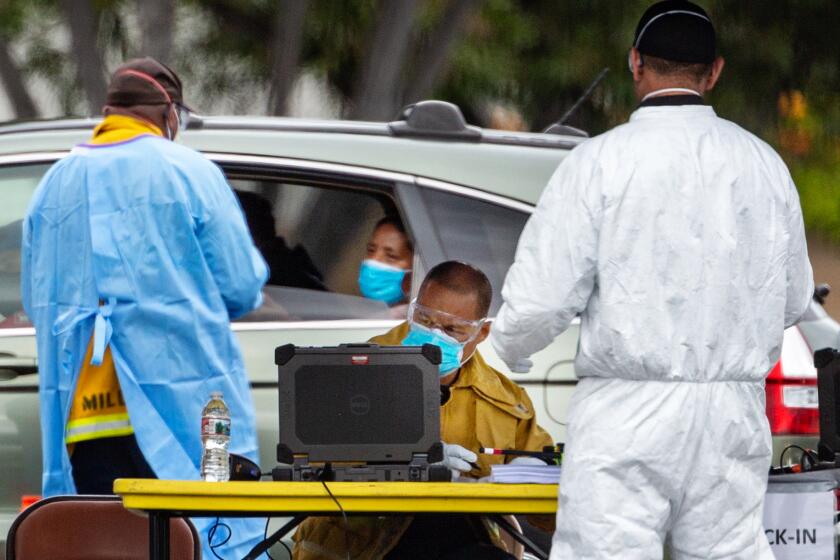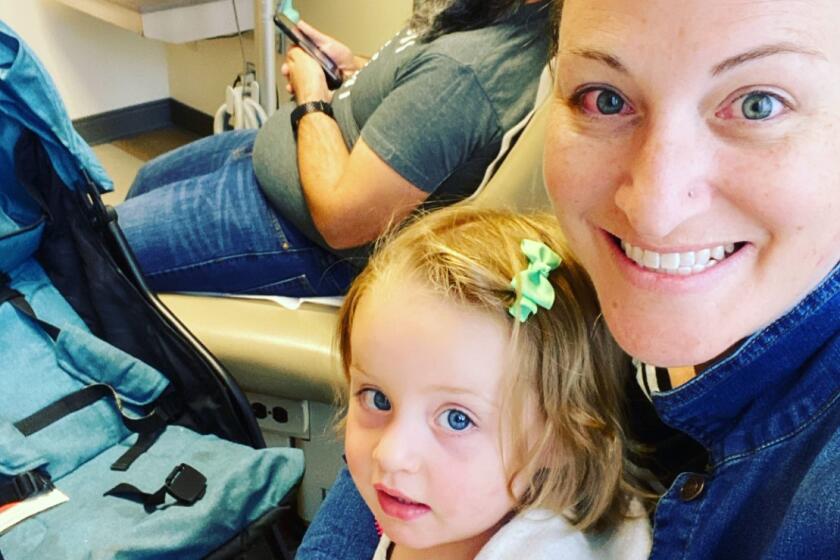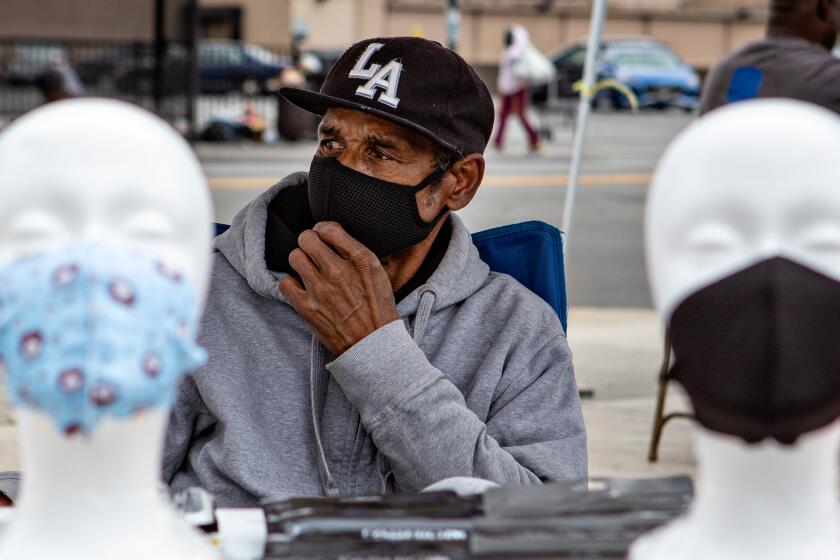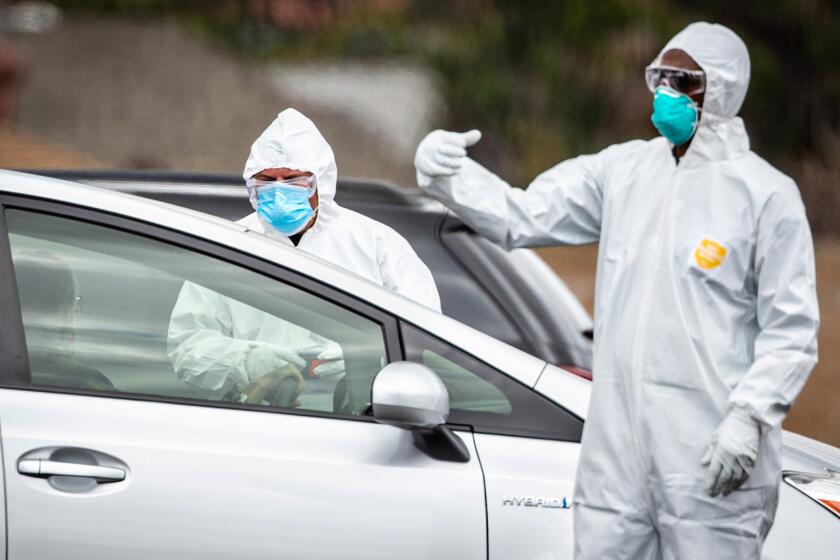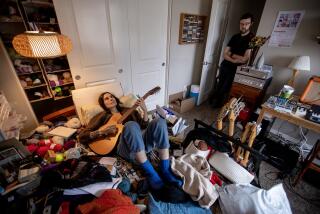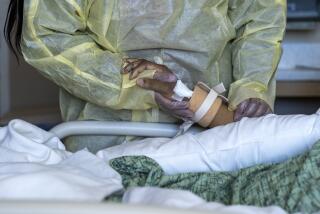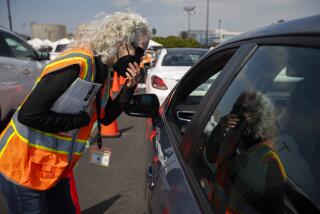He survived a shooting at Trader Joe’s. Would coronavirus be his downfall?
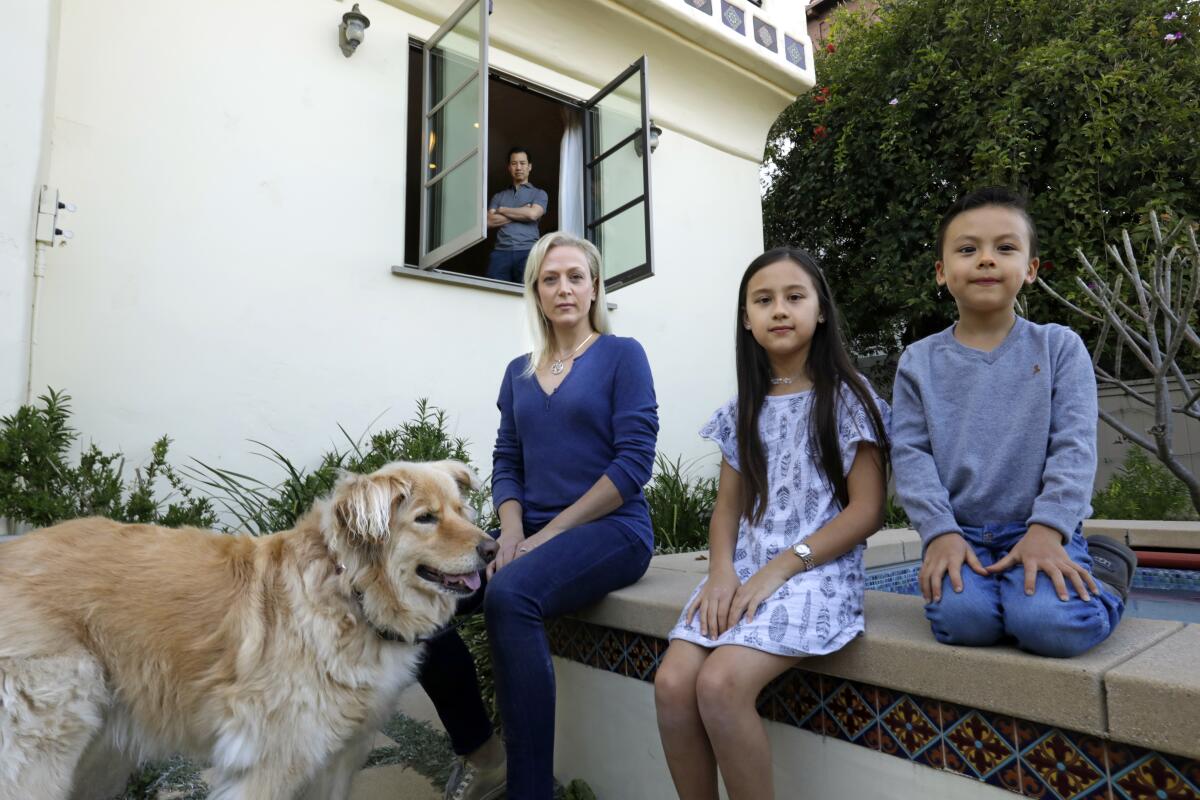
- Share via
It only took a bit of a chill and a slightly elevated temperature to send Kevin Lew to the bedroom with explicit instructions for his wife.
“From here on out,” he told her, “don’t come in unless you absolutely have to. When you come in, wear a mask, wear gloves. Try not to touch anything. When you leave, try not to touch anything else.”
For the record:
9:21 a.m. April 9, 2020An earlier version of this article stated that Kevin Lew is the son of a physician. He is the son of a dentist.
It would be days before Kevin received test results confirming that he was infected with the novel coronavirus. But as a Los Angeles oral surgeon, he was well-versed in the ways of contagion.
Within hours of feeling achy on an evening family walk March 21, he shut himself in the master bedroom of his Los Feliz home. There he would remain — except to drive himself to his doctor’s office March 23 — for the next 12 days.
His wife, Astrid, kept a pair of red Crocs by the bedroom door, which she would wear on her quick trips inside. She would leave disposable containers of broth or yogurt — what little food Kevin could stomach — on a table and leave, take off the Crocs and then carefully wipe them with sanitizer.
She could not lay a soothing hand on his fevered body. Their two young children could not stay by his side. Even the devoted family dog, Heidi, was banished from the sickroom.
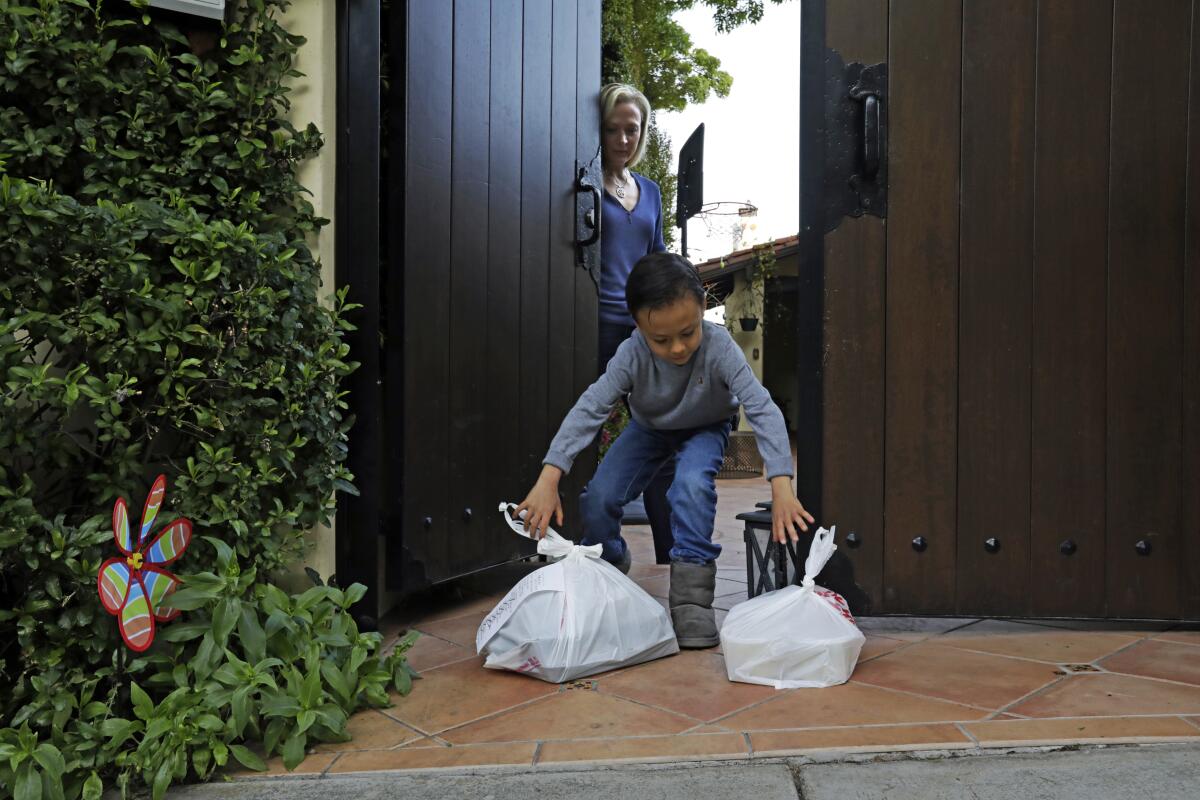
“Everyone talks about the isolation and not being around people,” said Kevin, 50. “But boy, not touching people and not being able to hug people you normally do has really been eye-opening.”
He suffered from headaches, a 101-degree fever, exhaustion and body aches. There were times when he was curled up in a ball, the sickest he has ever been. But the infection never progressed to the point where he had trouble breathing or required hospitalization.
Los Angeles County is expanding coronavirus testing to more people. Here’s how to get in line.
“For the most part I think I was fairly levelheaded about it,” said Kevin, a dentist’s son who grew up in Los Feliz. He suspects he contracted the coronavirus from a patient before the pandemic shut down much of Los Angeles.
He was more frightened of death in 2018, when he and others hid in a cold storage room of the Silver Lake Trader Joe’s during a shootout between police and a gunman that left a store manager dead.
He made it home unharmed before what might have been his final message to his family landed in Astrid’s inbox.
This threat has been less dramatic — and far more protracted.
Astrid, 37, knew that her husband’s profession put him at a higher risk of infection. So when he told her he wasn’t feeling well, she said her “heart just sank.”
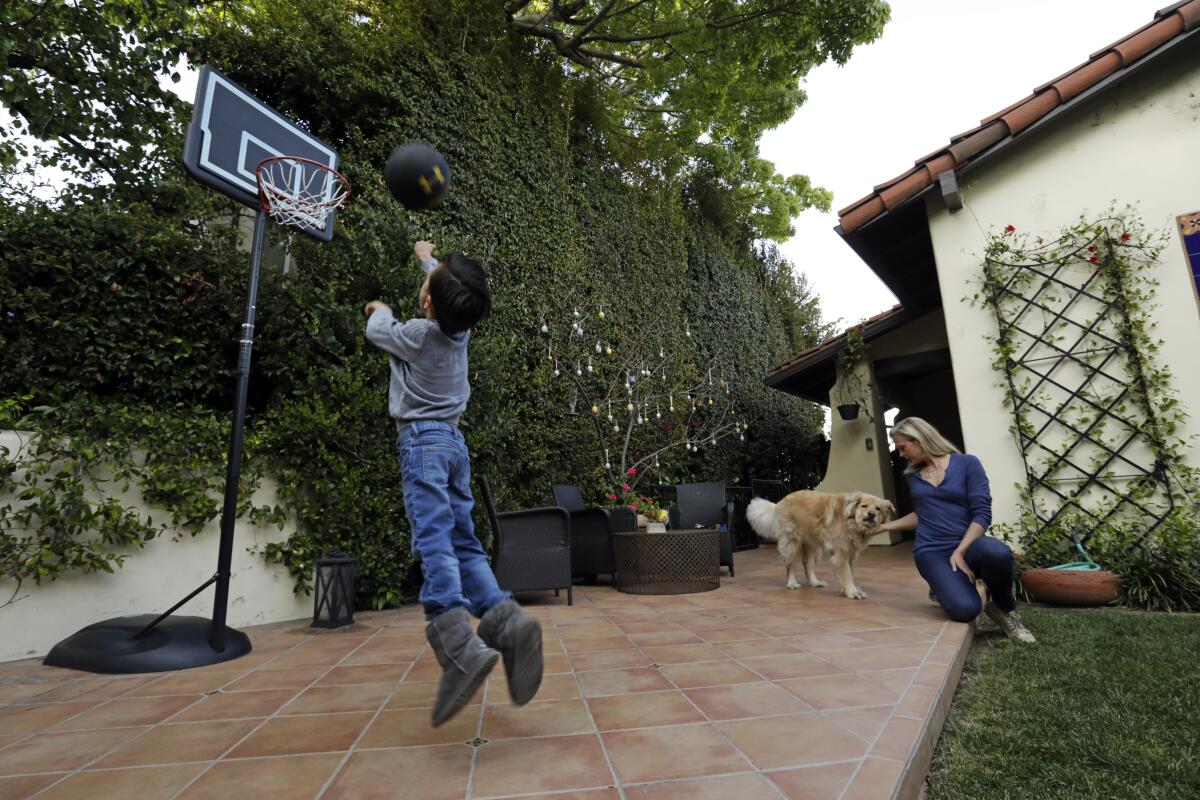
The next days were filled with anxiety and sleepless nights on the couch. It was frightening to see her normally “ultra-fit and super-healthy” husband so ill.
She worried about coming down with COVID-19. Who would care for their children, Eva, 9, and Brandon, 6?
Would the kids get it? Would the dog get it? What about their finances?
There will be thousands, maybe even millions, of sick parents unable to care for their young children. And there are no easy solutions.
Astrid knows they are fortunate in many ways. She is a stay-at-home mom. Kevin could self-quarantine in the master bedroom, which has its own bathroom and is on the downstairs level of their hillside home.
They had a household supply of masks and gloves that Kevin wore when the kids came down with a cold or flu.
Friends and family kept in constant touch. They sent meals, groceries, even wine to the house.
But in the end, it was up to her to navigate the strange new domestic world wrought by a deadly new virus.
That first night, she sat Brandon and Eva down and told them Dad was sick. She would need their help.
She started to keep her distance from them as much as possible. Even though young children on the whole have not fallen victim to the pandemic, she didn’t want to take any chances.
She wore a mask and gloves when she had to be near her son and daughter and when she prepared their meals. If they were in the same room with her, she sat apart.
They didn’t complain. They had learned about germs from their doctor father. “They’re the kind of kids that since they were little, they would use their knuckles to push elevator buttons,” she said.
Effective Friday, Los Angeles workers and residents must wear a mask, bandanna or other type of face covering while at essential businesses under an order from Mayor Eric Garcetti.
More difficult was Astrid’s self-imposed ban on touching Brandon and Eva, which she continued even after she received her negative coronavirus test results March 30. She figured the test was no guarantee that she still couldn’t get it and she wanted to protect them as much as possible.
“That has been the hardest part of it all,” she said on her 12th hug-less day. “My daughter understands. My son is pretty good about it. But it’s hard.”
Eva — whom Astrid describes as “almost 10, going on 40” — helped fill the void for her little brother.
“She’s like a second mom to him anyway — reading to him and making him read and cuddling with him. Just unbelievably good and helpful,” Astrid said.
Heidi, part chow and part golden retriever, pitched in too. “Kevin is by far her favorite human,” Astrid said. “She’s been guarding Kevin’s door and taking her job very seriously.”
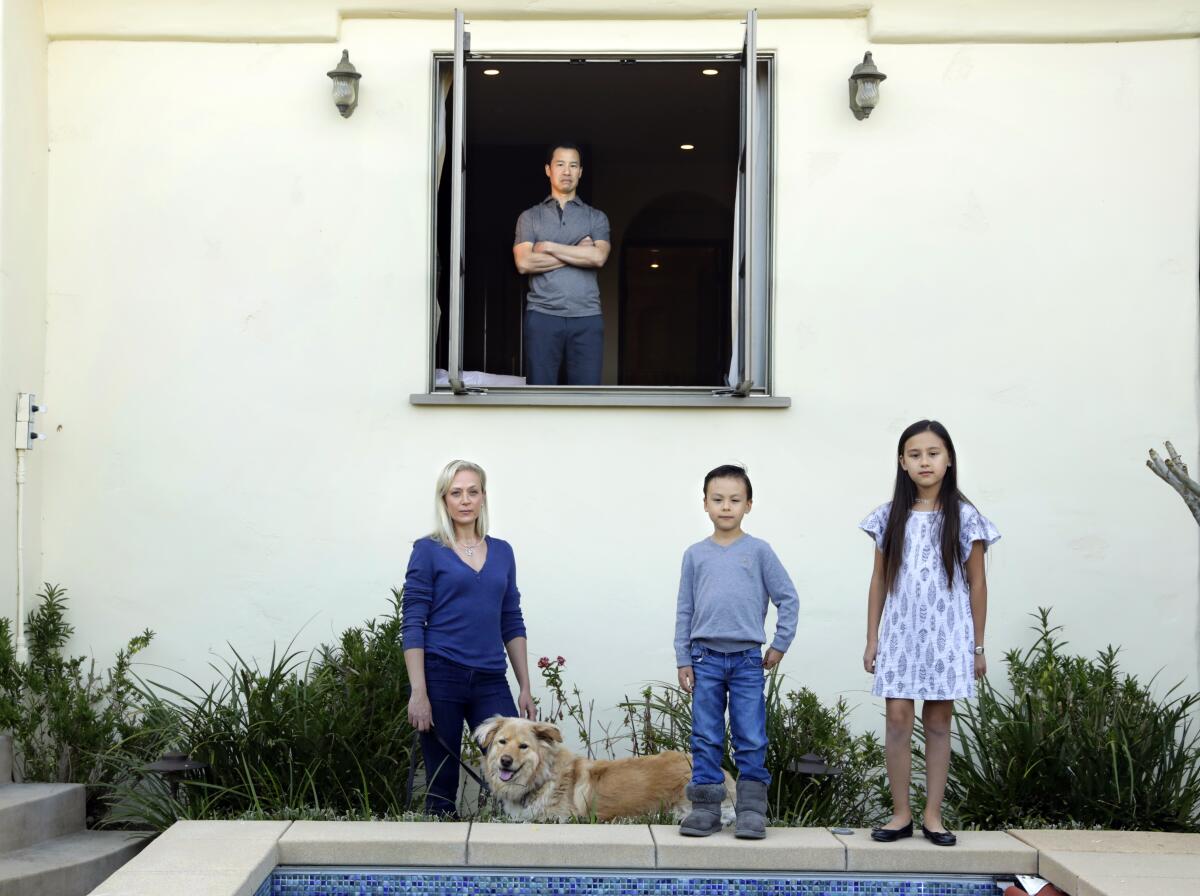
The children attend a private school, which has kept them busy with online learning. Eva, a fourth-grader, works all day on her own. But Brandon needs help — more for Astrid to do, but also a welcome distraction when Kevin was at his worst.
Then there were the nightly sanitizing sessions.
“When my kids were asleep, for an hour or more, I would disinfect everything that my kids would possibly touch. Light switches, door knobs, handles, soap dispensers.”
A week into Kevin’s quarantine, the children’s godfathers took Brandon and Eva for a weekend. “It gave me some time to rest and sanitize some more,” Astrid said.
Initially, the many offers of meal and grocery deliveries were hard for her to accept.
“I always cook. I think it’s probably very European,” said Astrid, who grew up in Switzerland. “But I got to the point where it was ‘Yes, thank you. Here’s my list.’ ”
Kevin emerged from the bedroom Friday. But he was still worried about shedding the virus and kept some distance from family members — except for Heidi.
He’s spoken to his doctor about the possibility of donating his antibody-laced plasma for coronavirus treatments.
As a COVID-19 survivor and surgeon who knows how to intubate patients to aid breathing, he also thinks he will be in a unique position to help if hospitals fill up with a surge of coronavirus patients.
In the meantime, he’s looking forward to soon catching up on family hugs.
From a reporter with COVID-19: No matter how you feel, act as if you have the coronavirus. You just might.
More to Read
Sign up for Essential California
The most important California stories and recommendations in your inbox every morning.
You may occasionally receive promotional content from the Los Angeles Times.
